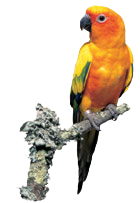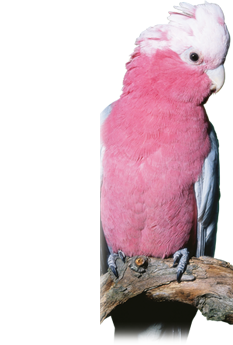Articles
Aggressive Birds
Like most animals, birds like to feel secure and will lash out with little bites if they feel threatened. While these nips rarely cause too much damage it can be painful and, if left uncorrected, can develop into an unwelcome habit.
Why do they bite?
Biting is essentially a defensive behaviour and may arise when you reach into their nest boxes or cage - after all, this is their home and will defend the right to own that space. In some cases, this behaviour may be triggered through jealousy. Some birds can become very attached to their owner and may lash out whenever they feel this relationship is being threatened by another person or even another animal.
Some sexually mature birds also become fiercely protective of their mate, while others learn how to be aggressive via rough games which encourage displays of strength and dominance (such as tug of war and even wrestling).
How to prevent it
Playing games with your bird is an important part of its social development and is a great way for the two of you to spend some quality time together. Your bird develops a lot of its behavioural patterns through its interaction with you so it is important these games are passive rather than aggressive.
 The golden rule when training any animals is to remain the dominant partner. Playing "fetch" for example is ideal as it encourages your bird to pick up and return an item to you and reinforcing your role as the "boss cocky".
The golden rule when training any animals is to remain the dominant partner. Playing "fetch" for example is ideal as it encourages your bird to pick up and return an item to you and reinforcing your role as the "boss cocky".
Teaching your bird to talk is another great way to reinforce positive behaviour as it usually involves one on one communication and the presence of treats or rewards.
Interaction with your bird should cease as soon as it displays any form of aggression. In time your bird will seek to avoid actions which disrupt its time with you and display those behaviours which instigate rewards.
Top tips
As you may have noticed, birds are easily startled and signs of aggression can sometimes be the result of sudden movements. Remember:
- Don't clean the cage with the bird inside
- Be calm and talk in a low tone of voice to your bird
- Don't make any sudden moves that may startle your bird
- Show your bird lots of love and attention
- Learn how to handle and hold a bird properly
- Don't encourage aggressive play
- If the bird has done something wrong, don't yell at it, a firm "no" is enough
- Bright or flashy clothing or nail polish can be overly exciting to some birds, be careful of what you wear
- Daily interaction helps build a trusting relationship and
- Make sure the bird gets enough sleep at night - put it in a quiet room of the house and fully cover its cage with a cloth.
